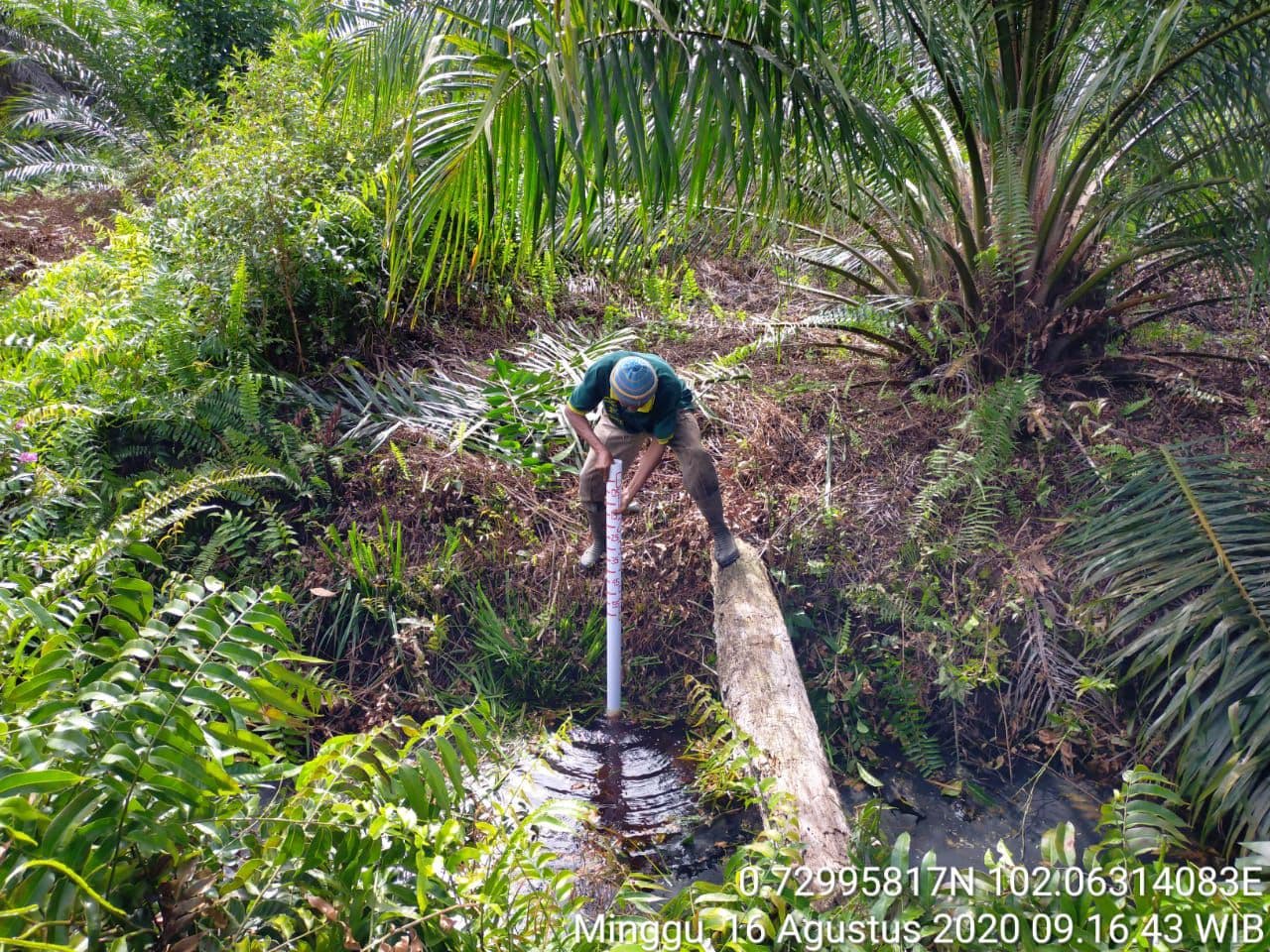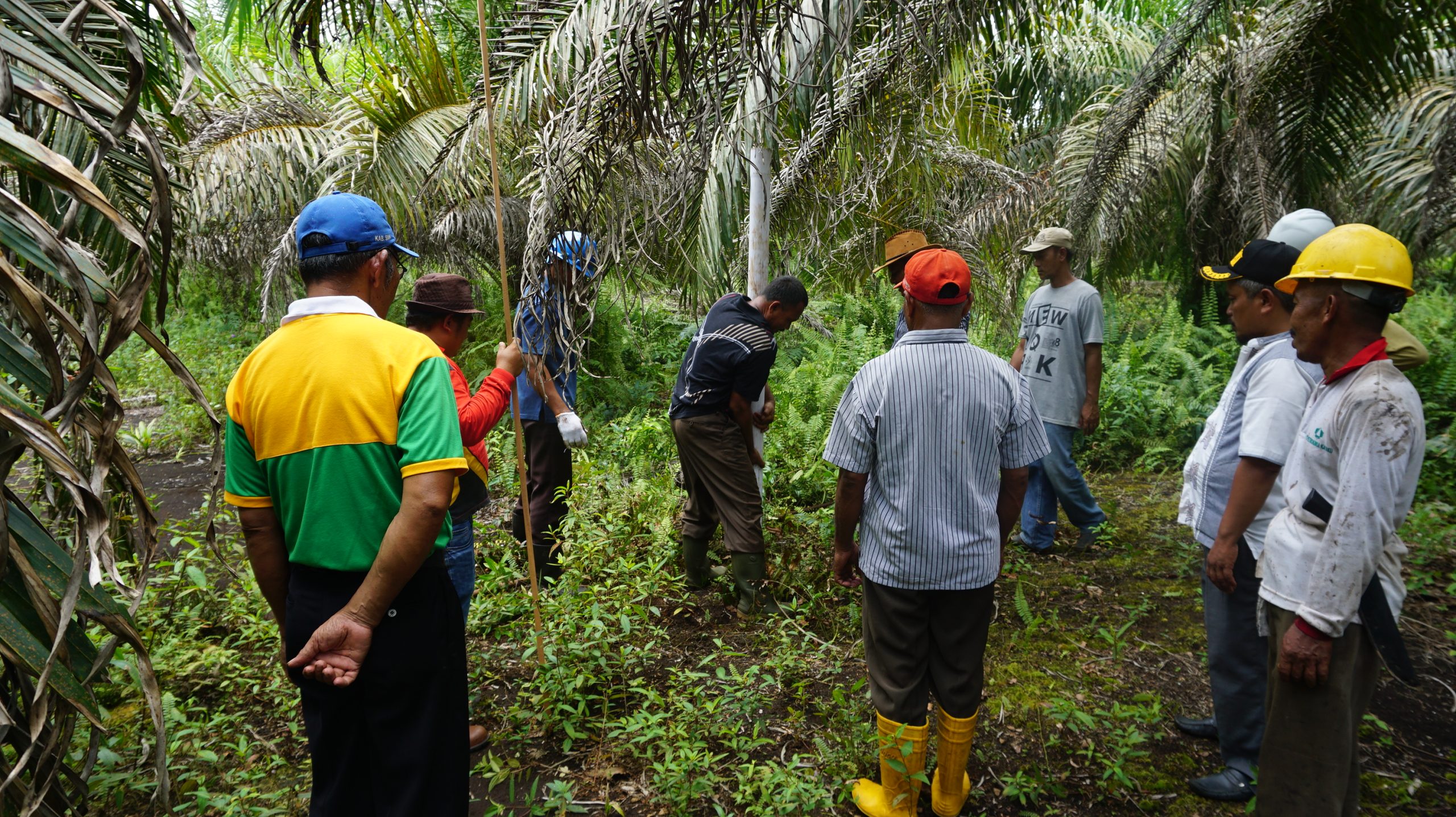
About the group
Number of smallholders: 114 (75 Men, 39 Women)
Total Land Area: 283.33 Ha
Status: Certified
Preserved Area: 37.90 Ha
Group location: Pemda Street RT.011 RW.004, Benteng Hulu Village, Mempura Sub-District, Siak District, 28773, Riau Province, Indonesia
Country: Indonesia
On-going Facilitator:
SUSTAINABILITY JOURNEY STORY
Smallholders protecting peatlands while cultivating oil palm
A group of smallholders cultivating oil palm in peatlands in a village in Siak of the Riau Province in Indonesia has successfully gained RSPO Certification, proving that they are serious and committed to addressing the importance of sustainable practices.
The smallholders are members of the Sawit Jaya Cooperative, which is located in the Benteng Hulu Village in Mempura Sub-district, Siak District, Riau Province, Indonesia. They have been cultivating oil palm since 2005/2006 in their plantations which are part of the notable peatland area in central Sumatra island.
Afif M. Nurudin, Group Manager of the Cooperative, said the smallholders are determined
to protect the peatlands from drainage and clearance. “Most of the plantations are located in the peatlands. So, we have to be very careful in securing our livelihoods.”
Indonesia holds a significant percentage of the world’s tropical peatlands, part of the ecosystem vital for storing carbon, biodiversity conservation, water resource management, and livelihoods. Over half of the areas in Siak District are carbon-rich peatland; some are even deep peat where water deposits are large. This means the oil palm in the Benteng Hulu village must be cultivated very carefully.
“The Cooperative just got RSPO Certification. This means that the smallholders have succeeded in meeting all standards, including those requiring the minimum water level of the peatland in the plantations,” said Afif. The minimum level must be maintained at between 40-60 centimeters; this is to avoid the peatland from getting dried which will potentially cause land fires and high greenhouse gas emissions, he explained.
He underlined that if the water level was under the required standard, there’s no way the Cooperative will be able to pass the strict verification of the production process to stringent RSPO Principles and Criteria.
To protect the biodiversity and ecosystem, the farmers have tried, among other things, to dam canals to stop possible drainage of the peat areas, he disclosed, adding that the action is very much in line with the regulation of the Indonesian Government on the protection and management of peatland.
He explained that preventing the peatlands from drying up is also part of the efforts to avoid forest and land fires.
Indonesia has often been badly affected by land and forest fires causing the haze that spreads to neighboring countries. One of the causes of such fires is dry peatland due to land clearing for cultivation, such as agriculture and plantation. Among the regions hit hardest by the fires and haze in Riau Province.
“It happened a long time ago, but there are no more land fires in this village since the early 2000s. If haze has recently occurred, it’s because of the effects from other areas during the dry season, not on purpose. Farmers have managed to establish sustainable livelihoods without clearing land using fires,” Afif reiterated.
Regarding mindset and behavior change, he admitted it was hard at the beginning for the smallholders to convert to sustainable practices, even though they had attended socializations and a series of training, which were well-arranged by WRI Indonesia, a non-profit research organization based in Jakarta.
“But we encouraged them continuously that there is no harm if we try to adapt the good agricultural practices, but we will get benefits if we join the RSPO. It’s good that we could finish what we must do and that we finally got the certification.”
The farmers are interested in participating because they are all independent smallholders and must always survive for the sake of the future, he continued. “We believe there must be a change to get something better. By now, we are always ready to protect the environment and society while cultivating oil palm.”
The Sawit Jaya Cooperative, according to Afif, also runs several units including credit union and retailer for fertilizer and pesticides, and is still consolidating to strengthen its organization and performance.
“We’re grateful to the local government of Siak, WRI, RSPO, and Unilever that have supported us to get the certification. By now we need help to repair the access to the plantation because about 30 percent of the road is in bad condition, so farmers must carry the harvests on motorbikes to avoid more damages.”
The proceeds from the sale of RSPO credits, he suggested, can be allocated to improve the infrastructure in the areas to ensure their harvest can reach the mill on time.
Project Impact
Total area covered by the project
283.33 Ha
Number of smallholders benefitting from this project
114 Smallholders
Number/percentage of women supported by this project
34.21% women in this project
How you can support
The group members are in the first year of being RSPO Certified and they need assistance from the third party to find the best model to improve their lives while managing their plantation in the peatland by the RSPO standards. This effort should be appreciated by the downstream players such as Consumer Good Manufacturers or retailers.
Please give us support in the sustainable supply chain by purchasing the RSPO Smallholders Credits. There will be more attention to protect peatland and also attention to improving the infrastructure in the plantation areas to ensure farmers’ harvest can reach the mill on time, so they can secure the highest price for their fruits which is the main source of their livelihoods.
GROUP CONTACT
Representative Contact
Afif M. Nurudin | ICS Manager | [email protected] |
Sutrisno
Chairman
(+62) 822-6822-4467
[email protected]
IMAGE GALLERY

Koperasi Sawit Jaya

Koperasi Sawit Jaya



